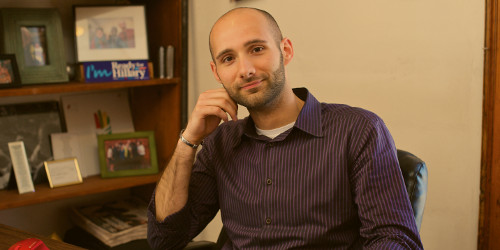
Program Manager TJ Rogers said Freedom House will refine a plan that decreases their reliance on government funds going forward. BTL File Photo: Andrew Potter.
A technical error in grant application scoring by the federal Department of Housing and Urban Development in December 2016 could have cost the Freedom House 60 percent of their annual budget, putting the organization at risk of closing its doors.
But a successful appeal coupled with a recount led to HUD's reversal of the organization's denied application and the reinstatement of its full grant for the 2017-2018 fiscal year.
For 20 years, $391,000 – more than half of the Freedom House's $750,000 budget – has come through funding from HUD. The remainder comes from Community Development Block Grant funds, a Health and Human Services Emergency Shelter grant, money from the United Nations Voluntary Fund for Victims of Torture, the HOPE fund, other smaller foundations and some individual donations.
During the last few months, the Detroit-based "gateway" for refugees and asylum seekers has found alternative sources of funding.
"It is difficult for me to express how profoundly grateful we are for the outpouring of support from our community during this crisis. Your donations, fundraisers, and appeals raised $329,943 for our vital services. Just as important, our residents were able to see how loved and cared for they are by our community," executive director Deborah A. Drennan wrote in a letter to Freedom House supporters.
Despite the Trump administration's antipathetic attitude toward immigrant populations, program manager TJ Rogers said, "People in our community and around the country are stepping up to say these aren't our values as a country and these aren't our values personally, so we want to step up and help this organization that is welcoming people who are yearning to breathe free which is very much in line with what and how our country was founded."
More than 1,000 individual donations were made to the Freedom House, according to Rogers.
"The community sees the value in our work and the need for our work, and they want to make sure we are able to continue to do what we do."
This will help the organization to fill 2 1/2 open positions on its small staff and continue providing services including temporary housing, food, and clothing; medical and behavioral health services; employment training, English as a Second Language and educational classes; and legal assistance in achieving political asylum status.
Founded in 1983, the Freedom House has helped some 1,400 refugees from 74 countries in the past decade. Rogers said 86 percent of the people who arrive on its doorstep are granted political asylum and 93 percent wind up in permanent independent housing.
When asked what the organization will do moving forward, Rogers said they are aware of the proposed 13 percent cut in HUD funding, which is already "quite competative."
The Trump administration will slash more than $6 billion in HUD funding and eliminate community development grants, according to a budget outline obtained by the Washington Post. The Office of Management and Budget's "blueprint" for 2018 puts HUD's funding at $40.7 billion, down from $46.9 billion in 2017.
In response, the Freedom House will refine a plan that decreases their reliance on government funds, according to Rogers, and increases funding from philanthropic and corporate funders as well as individual donors.
"We have this additional year to continue to build relationships through friendraising efforts to ensure that we're able to be sustainable in the long term," he said, noting that HUD funding beyond 2018 is not a guarantee.
Drennan wrote in her letter that the organization is planning a community celebration so that their staff can say "thank you" to supporters who have "shown such love and generosity to Freedom House and its residents." Stay tuned to email and social media for details.











